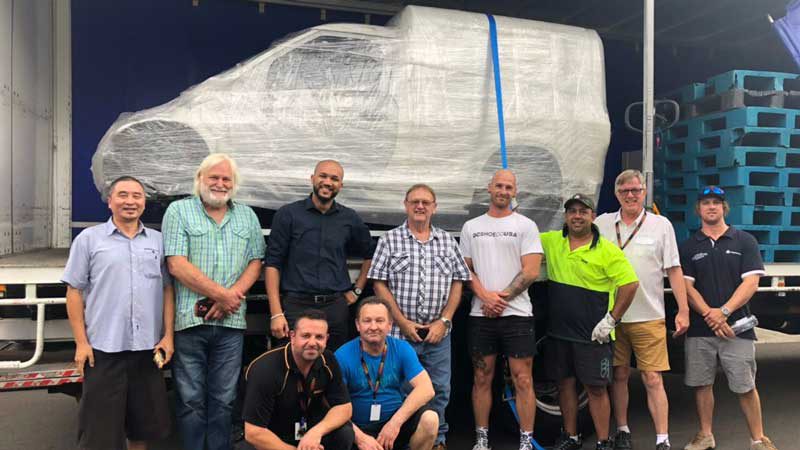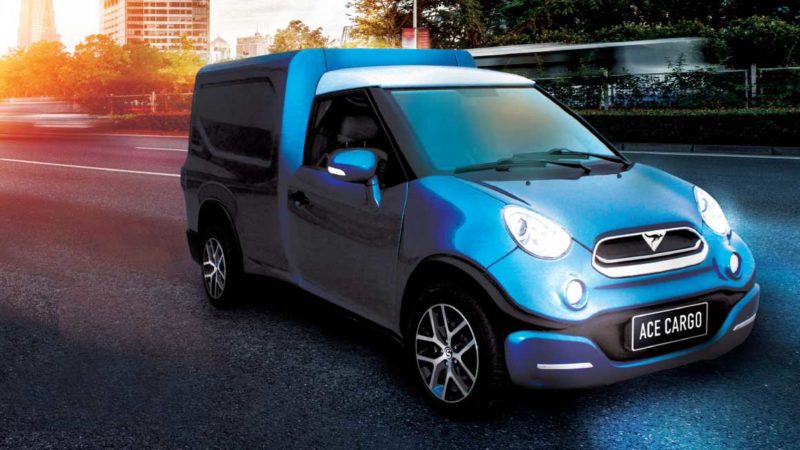The first all-electric vehicle assembled entirely in Australia will be officially launched next week in Sydney, bringing Australia a step closer to a home-grown electric vehicle industry to replace the fossil fuel car industry that closed a few years ago.
The completed delivery van is the brainchild of CEO Gregory McGarvie and will be revealed to the Australian public at the Smart Energy Expo in Sydney next Tuesday. It is the first prototype assembled here out of the Australian Clean Energy Electric Vehicle (ACE-EV) group’s four planned electric vehicles.
Assembled by a team of local and international engineers and technicians, the vehicle took its first test drive after the Carmageddon event held by the Motor Traders Association of Queensland last week.

Evolved from an initial venture begun with fellow ACE-EV founder Will Qiang called Get Green, ACE-EV’s mission is to create a “smart, clever, quick, and replicable [electric vehicle] industry,” says McGarvie.
A partnership with Dr Charles Kung, previously chief engineer for Taiwan’s high speed train, and Gerhard Kurr, formerly of German Binz, makers of ambulances and hearses, fast-tracked the design of a lightweight carbon-fibre reinforced plastic monocoque that is at the core of ACE-EV vehicles.
The 3.9 metre long Cargo, as it is known, can carry payloads of half a tonne and has the potential to lower fleet greenhouse gas emissions by 70 per cent and running costs by 85 per cent, according to data provided by ACE-EV.
Its 33kWh battery offers up to 250km on a single charge with a partial load, with a max power output of 45kW from the motor.
As the first of a series of vehicles planned by ACE-EV, the Cargo has a target price of $A39,995, is aimed at fleets and can be customised to suit customer needs, such as the cargo area in the back.
If a business customer’s needs demand another type of body, such as the trayback “Yewt” aimed at tradespersons and farmers, or the “Urban” city car – an order of as little as 200 is enough to make a change of body financially possible.
“The key difference between our car is we can do a model change, and only 200 cars will justify that cost,” says McGarvie.
“We are focussed on fleets – what’s attractive is that we can customise to commercial needs quickly and cheaply.
“There is now an Australian solution that for EVs that didn’t exist before,” says McGarvie, noting that ACE-EV’s approach is unique is quite different to SEA Electric, the EV company electrifying existing van and truck bodies in Victoria’s La Trobe Valley.
ACE-EV first plans to assemble 100 of the vehicles, which it says is both practical and economical, in its first run for 2019.
Given enough interest, it will then increase its run next year to 600 and then 3,000 the following year.
But starting a new car industry (particularly in Australia) is not easy – let alone one built on a relatively fledgling technology, such as electric powertrains – just ask Elon Musk, CEO and founder of pioneering EV company Tesla.
“If it hadn’t been for Elon, I wouldn’t be talking to you now,” says McGarvie with a laugh.
“We’ve spoken to lots of people in the automotive and mobility industry – there’s lots of advice that we can’t do it,” he says.
Finding funding to further the growth of ACE-EV has so far been a challenge, says McGarvie, although he hints at a deal hailing from South Australia that will be announced on Tuesday.
While ACE-EV also has its sight set on the export market through its partnerships, an exclusive agreement stands until the end of June for development and sales of right hand drive ACE-EV vehicles in Australia.
At the launch, which is to be held at the International Convention Centre in Sydney on Tuesday, commercial outfits such as Australia Post – which recently ordered another 1,000 Swiss-designed electric delivery vehicles – will be on hand to check out the ACE Cargo, says McGarvie.
Such an order is vital to the success of ACE-EV in Australia – as MacGarvie explains, if sufficient interest is not generated soon, the exclusive agreement will expire and production may go overseas.

Bridie Schmidt is associate editor for The Driven, sister site of Renew Economy. She has been writing about electric vehicles since 2018, and has a keen interest in the role that zero-emissions transport has to play in sustainability. She has participated in podcasts such as Download This Show with Marc Fennell and Shirtloads of Science with Karl Kruszelnicki and is co-organiser of the Northern Rivers Electric Vehicle Forum. Bridie also owns a Tesla Model Y and has it available for hire on evee.com.au.

